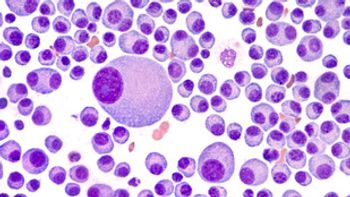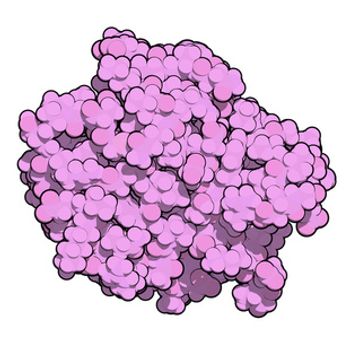
Many people associate the BRCA mutations with breast and ovarian cancer and mistakenly think they, and other genes that contribute to cancer, don’t affect men, said Sue Friedman, DVM, executive director of FORCE: Facing Our Risk of Cancer Empowered.


Many people associate the BRCA mutations with breast and ovarian cancer and mistakenly think they, and other genes that contribute to cancer, don’t affect men, said Sue Friedman, DVM, executive director of FORCE: Facing Our Risk of Cancer Empowered.

A new initiative seeking to transform healthcare delivery will elevate precision medicine with a focus on cancer, Alzheimer disease, cardiovascular disease, and more.

A phase 2b clinical trial is producing promising results for a personalized cancer vaccine used in patients with stage III and IV resected melanoma.

As expensive precision medicines come to market, employers are willing to cover the costs if these medicines are shown to work and improve patient experience or outcome, said Neil Goldfarb, president and chief executive officer of the Greater Philadelphia Business Group on Health.

Pediatric patients with relapsed or refractory B acute lymphoblastic leukemia (B-ALL) with minimal residual disease (MRD) who were treated with blinatumomab proceeded to hematopoietic cell transplant (HCT) without delay and had limited side effects.

Achieving undetectable minimal residual disease (MRD) status is important for deep and durable responses in patients with chronic lymphocytic leukemia (CLL), according to 2 abstracts presented at the 2019 American Society of Clinical Oncology Annual Meeting.

While minimal residual disease (MRD) is being used to assess response to treatment in multiple myeloma (MM), the level of risk a patient has can make a big different in how well MRD works as a prognostic indicator, according to 2 abstracts presented at the 2019 American Society of Clinical Oncology Annual Meeting.

A new blood test being worked on can detect 8 common cancer types in a way that is less invasive than other tests, said Jeanne Tie, MBChB, FRACP, MD, medical oncologist and associate professor at the Walter+Eliza Hall Institute of Medical Research.

Currently, the number of patients who are actually utilizing precision cancer care treatments is small, but it is growing fast. As that happens, physicians will need to get comfortable with ordering the right tests, explained Clynt Taylor, chief executive officer of Intervention Insights, and Lee Newcomer, MD, formerly of UnitedHealth Group.

The FDA is partnering with COTA, a precision medicine technology company, to gain better insight into treatment variation within subpopulations of patients using real-world data. The program will start with breast cancer and may expand to other cancer types.

The results of the NCI-MATCH precision medicine trial showed that a drug combination designed to target cancers with certain BRAF gene mutations was effective.

Genetic testing and understanding family history of cancer is important because more and more targeted therapies are coming out that are designed to work with specific mutations or inherited forms of mutations, said Sue Friedman, DVM, executive director of FORCE: Facing Our Risk of Cancer Empowered.

Circulating tumor DNA (ctDNA) can now allow clinicians to better understand which patients are at high risk of recurrence and should be offered intensified chemotherapy, said Jeanne Tie, MBChB, FRACP, MD, medical oncologist and associate professor at the Walter+Eliza Hall Institute of Medical Research.

Contrary to conventional wisdom, higher levels of genomic instability have been associated with lower immunogenicity, which means drugs are less effective, in patients with BRCA1/2-related breast cancers, according to research published in Clinical Cancer Research.

The follow-up to the landmark TAILORx trial shows that adding a clinical risk evaluation of the breast cancer tumor may have prognostic value; the authors' recommendations are drawn from other studies.

Patients with advanced pancreatic cancer linked to germline genetic mutations did not see their disease worsen for an additional 3.6 months when treated with olaparib, but an early interim analysis did not show a statistically significant difference in overall survival (OS), according to study results presented Sunday at the American Society of Clinical Oncology Annual Meeting 2019.

Testing for minimal residual disease (MRD) is increasingly being used in patients with cancer because deep MRD negativity is associated with better outcomes for patients and MRD status can help make decisions regarding treatment. Two abstracts presented at the 2019 American Society of Clinical Oncology Annual Meeting validated use of MRD testing in the real world and found it was cost-effective.

FDA approved alpelisib (Piqray), an oral drug to be used in combination with endocrine therapy fulvestrant for the treatment of men and postmenopausal women with hormone receptor (HR-positive), human epidermal growth factor receptor 2 (HER2)-negative, PIK3CA-mutated, advanced or metastatic breast cancer following disease progression on or after an endocrine-based regimen.

Things like smoking, poor diet, and lack of exercise can increase a person’s risk of developing cancer, but there are some things that are actually more clinically acute outside of family history that every patient needs to look out for, explained Feyi Olopade Ayodele, MBA, chief executive officer at CancerIQ.

Spanish researchers have identified 3 biomarkers, including minimal residual disease negativity, that can help define those elderly patients with multiple myeloma (MM) who are likely to achieve long-term disease control.

Patients with ovarian cancer are undertested for the presence of mutations that could help guide healthcare decisions, according to research published in Journal of Clinical Oncology.

With CancerIQ, we’re really going to be helping push population health into the oncology arena where we can hopefully predict and preempt this very costly and devastating disease well in advance, says Feyi Olopade Ayodele, MBA, chief executive officer at CancerIQ.

In oncology, precision medicine is already well established with targeted therapies approved based on the patient’s genetic makeup or genetic variants of their tumor, and using precision medicine successfully means also using diagnostics and next-generation sequencing (NGS). Last year, CMS finalized coverage of NGS tests, which are to be used to identify patients that may benefit the most from approved treatments. And it looks like other payers may be following CMS’ lead.

Researchers say by targeting a protein that assists KRAS mutations, they have overcome the challeges of resistance to treatment in a mouse model.

The use of the circulating tumor DNA workflow demonstrated a proof of concept for this system of guiding treatment in the most common form of ovarian cancer.

259 Prospect Plains Rd, Bldg H
Cranbury, NJ 08512
© 2025 MJH Life Sciences®
All rights reserved.
